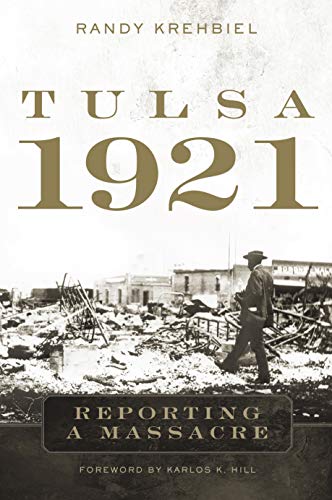Tulsa, 1921
Reporting a Massacre
Randy Krehbiel
BOOK REVIEW

In the haunting aftermath of the Tulsa massacre of 1921, Randy Krehbiel's Tulsa, 1921: Reporting a Massacre emerges as a vital narrative, illuminating the shadows of racial violence that still echo in contemporary America. This gripping, illustrated account intertwines detailed reporting with poignant reflections, compelling readers to confront the grotesque realities of one of the deadliest racial conflicts in American history.
Krehbiel, a seasoned journalist, masterfully channels the voices of those tragically lost and those who survived-rendering them not just as numbers in a historical ledger but as vibrant human lives with dreams, aspirations, and stories. He captures the essence of Greenwood, a thriving Black community, before the inferno of hatred consumed it. You cannot help but feel outrage at the injustice as he documents the chaos and the indifference displayed by those in power as the violence unfolded.
What grips you is not merely the blood-soaked history but Krehbiel's meticulous attention to detail. Each page reverberates with the pain of loss-there are heartbreaking accounts from eyewitnesses, the shivering fear of families torn apart, and the deafening silence that followed. It's a narrative that challenges you to engage with your own understanding of race relations, history, and justice. It asks you to reflect-how often do we sanitize our past? How frequently do we allow atrocities to slip into the murky depths of forgotten memory?
The reception to this powerful work is as varied as the accounts it portrays. Readers are divided; some praise Krehbiel's dedication and depth of research, marveling at how he brings to life the vibrant culture of Greenwood before its annihilation. Others voice discomfort, suggesting that the graphic depictions of violence are too harrowing. Yet, in a world where the narratives of marginalized communities are often silenced or distorted, perhaps discomfort is a catalyst for growth.
This book serves as a clarion call to remember, to learn, and to grieve-for the lives eradicated not only by fire and bloodshed but by historical amnesia. Those reluctant to face the truth may find themselves disarmed by Krehbiel's unflinching honesty. As the pages turn, you're confronted not just with events of the past but with their implications on our present.
The broader implications of Tulsa, 1921: Reporting a Massacre resonate powerfully today. In a time when racial tensions seem to flare anew, this narrative encourages us to dig deep into our own societal fabric. It's a reminder that the seeds of racism and violence, if left unchecked, can plague communities for generations. Imagine feeling the weight of this history on your shoulders, urging you to act, to speak out, to ensure that such a tragedy never repeats itself.
Krehbiel's work doesn't merely recount a massacre; it beckons you into a riveting exploration of resilience, survival, and the pressing need for social justice. It comes to life through Krehbiel's words in a tragic tableau that ignites both awareness and action. The massacre wasn't just an event; it was a wound that still festers, a cry for accountability and recognition.
As with all powerful literature that delves into uncomfortable truths, Tulsa, 1921 has the potential to shift paradigms. The conversations it ignites are imperative for a society striving toward equity and healing. It's fascinating and unsettling to realize that this historical account binds the past to an urgent contemporary dialogue.
This isn't just a historical recount; it's a lifeline thrown to a generation of readers demanding to understand our collective past. The urgency of Krehbiel's message sizzles on the page, leaving you with a sense of duty-will you turn away, or will you amplify the voices that struggle to be heard?
Reading Tulsa, 1921: Reporting a Massacre is a journey that urges you to reflect deeply on morality, injustice, and the relentless pursuit of truth. Are you ready to confront a history that still shapes our reality? Let this be the book that transforms not only your understanding but also the way you interact with the world around you. This is not just history; this is a call to action. 🌍
📖 Tulsa, 1921: Reporting a Massacre
✍ by Randy Krehbiel
🧾 306 pages
2019
#tulsa #1921 #reporting #massacre #randy #krehbiel #RandyKrehbiel